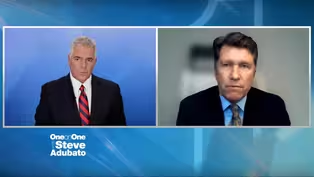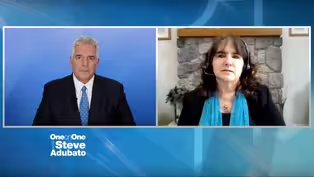One-on-One
Mental Health Concerns in our Political Environment
Clip: Season 2024 Episode 2723 | 10m 12sVideo has Closed Captions
Mental Health Concerns in our Political Environment
Steve Adubato and One-on-One Correspondent Mary Gamba talk with Michael Schmidt, Executive Director and CEO of The Healthcare Foundation of New Jersey, about the growing mental health concerns given world politics, rising antisemitism, and the shortage of quality healthcare staff.
Problems playing video? | Closed Captioning Feedback
Problems playing video? | Closed Captioning Feedback
One-on-One is a local public television program presented by NJ PBS
One-on-One
Mental Health Concerns in our Political Environment
Clip: Season 2024 Episode 2723 | 10m 12sVideo has Closed Captions
Steve Adubato and One-on-One Correspondent Mary Gamba talk with Michael Schmidt, Executive Director and CEO of The Healthcare Foundation of New Jersey, about the growing mental health concerns given world politics, rising antisemitism, and the shortage of quality healthcare staff.
Problems playing video? | Closed Captioning Feedback
How to Watch One-on-One
One-on-One is available to stream on pbs.org and the free PBS App, available on iPhone, Apple TV, Android TV, Android smartphones, Amazon Fire TV, Amazon Fire Tablet, Roku, Samsung Smart TV, and Vizio.
Providing Support for PBS.org
Learn Moreabout PBS online sponsorship(upbeat music) - Hi everyone, Steve Adubato.
You're about to see an interview I did with my colleague, Mary Gamba, on our sister program "Lessons and Leadership with Michael Schmidt," who is the Executive Director and Chief Executive Officer of the Healthcare Foundation of New Jersey.
Take a look at this interview as we talk with Michael about antisemitism, the challenge of antisemitism, the impact mental, excuse me, that antisemitism is having on the mental health, particularly in the Jewish community, with younger people, the dearth, the shortage, if you will, of mental health professionals.
The role of a foundation like the Healthcare Foundation in funding and supporting not-for-profits, and a whole range of challenges that the not-for-profit community faces right now in 2024.
This is an interview that I did with Mary Gamba, along with Michael Schmidt from the Healthcare Foundation.
Let's check it out.
Steve Adubato, with my colleague, Mary Gamba.
Mary, why don't we introduce our very special guest who's talking about leadership in the nonprofit world and a whole range of other issues, please, Mary.
- Yeah, happy to do so.
Michael Schmidt, Executive Director and CEO of the Healthcare Foundation of New Jersey.
Michael, so glad to have you back with us once again to talk all things leadership.
- Yeah, and also.
- Thank you, Mary, - Sorry for interrupting, Michael, that's the difference studio versus remote.
Michael, all things leadership, but related to leadership as well, and to disclose The Healthcare Foundation is a major underwriter of ours in our healthcare programming.
But one of the things Michael, I wanna talk to you about is leadership and antisemitism.
More specifically, the initiative at the Healthcare Foundation, dealing with the extraordinary, painful, difficult challenges that folks are facing as it relates to antisemitism, as it relates to mental health, and the initiative of the Healthcare Foundation to address that directly, please, talk about it.
- Thank you Steve, and thank you Mary.
It's great to be back on broadcast with you.
As you know, Steve and Mary, there's been a rise in antisemitism around the world, and specifically here in the United States.
Statistics say that anti-hate crimes against Jews are number one.
There was just a report in today's newspaper saying that within schools, that antisemitism has risen against the LGBT community, Jews and Blacks.
So recognizing that our youth are faced with increasing isolation, depression, anxiety, and other kinds of mental health challenges that have emerged not just from the rise in antisemitism, and the events that have happened since October 7th, but also as a result of the pandemic and tremendous amount of isolation that they incurred.
We recently issued an RFP in the community to address the mental health of youth and teens, and particularly we were asking community partner members in the greater Essex area to collaborate with one another and to come up with new and innovative techniques or techniques that have been found to be successful in other parts of the country, that can be replicated here in New Jersey to address this level of anxiety within the Jewish community.
- Along those lines, before Mary jumps back in, from my perspective, and again, I'm not here to editorialize, but it seems like every obstacle, challenge, barrier, terrible situation like this, and to those who are negatively affected in the Palestinian community, there's just as much concern and we'll do focused programming in that regard as well.
But the issue of rising antisemitism, a serious problem, which also presents, dare I say, an opportunity, Michael, to respond in the appropriate way, is that not the essence of leadership to take every challenge and see it as an opportunity to do better, please.
- Steve, you know, I just wanna contextualize that antisemitism is not a problem just for the Jewish community.
It's a problem for everybody.
I think everybody who is a decent and a caring human being wants to know that they can be able to live in a society where one individual or one group of individuals is not singled out, is not addressed, is not taunted, not bullied, and not meant to felt as a secondary kind of citizen.
And that's true for everybody, whether you're Muslim, whether you're Jewish, whether you're Catholic, or whatever you may be.
And I know that all of my friends, partners in the Muslim community have also suffered tremendous amounts of bullying.
But I think what is unique within the Jewish community is that this has reared, unfortunately, its ugly head much more in the last year when people thought that we had been making progress.
And to your question, leadership is exactly about that.
It's about speaking out for everyone and taking stands to make sure that everyone feels protected, safe, and able to participate in society to the best of his or her ability.
- Yeah, along those lines, Mary, I don't know why I even framed it that way.
That was not only inappropriate but wrong.
Say, we'll focus on Palestinians who have been victimized in this, because it's not one or the other.
An attack on one an attack on all.
Along those lines.
Mary, please jump in.
- Yeah, definitely.
Michael, I would like to talk a little bit really along this same vein of the shortage in healthcare workers, in particular mental healthcare workers.
What more of an impact, how much more strain is that putting?
Because if I'm hearing you correctly, and, you know, you can't turn on the news without hearing the impact, especially on our young adults, on their mental health, their behavioral health, and just overall issues of depression, suicide, what more needs to happen to make sure that we have the professionals available and accessible to our most vulnerable citizens?
- So, Mary, it's an excellent point that you're raising, there is a dearth of qualified professionals, particularly clinicians.
And when you speak to anyone who is looking and searching for a qualified clinician, the wait list is often six months or longer.
And so this is a longer-term issue with an immediate crisis.
We speak to our community partners, whether they be in the Jewish Family Services, or whether they be in other kinds of clinical settings that are trying to provide assistance.
And we know that, number one, it's hard for them to find qualified people.
Much of the money that had been available during the pandemic through the PPE and other kinds is now dissipating.
And so some of the ability of organizations, and nonprofits in particular, to try and use that money to leverage and bring in good qualified clinicians, even on a part-time basis, I know you've had partners that we fund on this show who are in that field, will acknowledge that this is increasingly a challenge.
And New Jersey has recognized this by recently changing some of the rules around social workers in particular, and clinicians and social workers, and expanding the ability of people to reach across certain state lines in order to provide clinical service.
- One other leadership gap, and Michael, you and I have talked offline about this a little bit, but is the succession planning, that is really tied to baby boomers retiring, whether we're talking about leaders of nonprofits.
Steve and I have seen it now.
We're 24 years in working together.
We have tons of people around us that are retiring.
What can and should be happening from a leadership standpoint to make sure that there are people adequately ready to lead, to step up, and to fill those roles?
- Thanks for raising that very, very important issue, Mary.
You know, I think from the first day that a CEO starts, the question needs to be, who is going to be my successor?
Who is going to be trained, who is going to be cultivated, who is going to have the skillsets to be able to step in?
We're seeing a lot of millennials, wanting to take on more responsibility.
We're seeing a lot of baby boomers stepping down and retiring, and we need to fill those positions.
And most organizations don't spend enough time thinking about the succession planning, and what are the skill sets that you need for somebody to be able to step into the role of executive director, whether it's board development, whether it's fundraising, whether it's operations, each of those need appropriate cultivation, learning, and skill development, and it takes time.
And so I hope that many of the organizations that are looking towards the next five and 10 years where there's going to be a dearth of leaders will be thinking about that today.
- Michael Schmidt is the Executive Director, CEO, and CEO of the Healthcare Foundation of New Jersey.
Michael, we greatly appreciate your time.
Thanks.
- Thank you, Steve.
Thank you, Mary.
Pleasure to be with you.
- You got it.
Stay with us, we'll be right back.
- [Narrator] One-On-One with Steve Adubato is a production of the Caucus Educational Corporation.
Celebrating 30 years in public broadcasting.
Funding has been provided by Horizon Blue Cross Blue Shield of New Jersey.
NJM Insurance Group.
Robert Wood Johnson Foundation.
The Russell Berrie Foundation.
Valley Bank.
Veolia, New Jersey Sharing Network.
The North Ward Center.
And by And by Kean University.
Promotional support provided by The New Jersey Business & Industry Association.
And by Northjersey.com and Local IQ.
NJM Insurance Group has been serving New Jersey businesses for over a century.
As part of the Garden State, we help companies keep their vehicles on the road, employees on the job and projects on track, working to protect employees from illness and injury, to keep goods and services moving across the state.
We're proud to be part of New Jersey.
NJM, we've got New Jersey covered.
CEO & Publisher of ROI-NJ Talks Leadership & Innovation
Video has Closed Captions
Clip: S2024 Ep2723 | 10m | CEO & Publisher of ROI-NJ Talks Leadership & Innovation (10m)
Opportunities and Challenges Facing the Non-Profit Sector
Video has Closed Captions
Clip: S2024 Ep2723 | 8m 14s | Opportunities and Challenges Facing the Non-Profit Sector (8m 14s)
Providing Support for PBS.org
Learn Moreabout PBS online sponsorship
- News and Public Affairs

Top journalists deliver compelling original analysis of the hour's headlines.

- News and Public Affairs

FRONTLINE is investigative journalism that questions, explains and changes our world.












Support for PBS provided by:
One-on-One is a local public television program presented by NJ PBS

